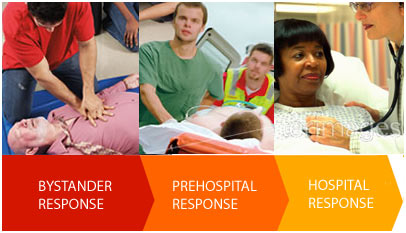What Makes the HeartRescue Project Unique?
The HeartRescue project is designed to improve how SCA is recognized, treated and measured around the world. The HeartRescue Project approach builds on decades of best practices at the bystander, prehospital and hospital level, combining them under one program in order to expand geographic reach.
Key elements include:
- Publicly stated/measurable goals (a 25% increase in survival rates over the next four years in new partner geographies)
- A common set of data elements used to measure performance and outcomes
- State-based reach, to include every size of community
- Highly collaborative environment, bringing together leaders, influencers, and hundreds of stakeholders in each state
- A focus on incremental system quality improvement via demonstrable, data-driven evidence
- A commitment to sharing information and publishing results
History
Launched in the United States in 2011, the HeartRescue Project began as a multi-state collaborative program funded by the Medtronic Foundation to improve sudden cardiac arrest (SCA) survival rates. Today, with impressive results in many states, the effort is now expanding in the U.S. and internationally to enhance life-saving emergency interventions for other heart-related events.
The University of Washington now leads HeartRescue US with continued funding from the Medtronic Foundation. Today, the project extends to emerging markets as HeartRescue Global, with programs in Shanghai and Suzhou China, Bangalore, India, and São Paulo, Brazil.


